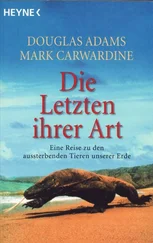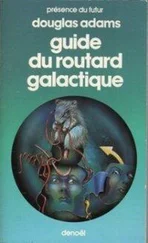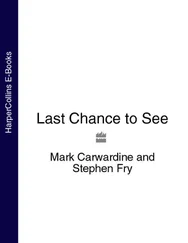Douglas Adams - Last chance to see
Здесь есть возможность читать онлайн «Douglas Adams - Last chance to see» весь текст электронной книги совершенно бесплатно (целиком полную версию без сокращений). В некоторых случаях можно слушать аудио, скачать через торрент в формате fb2 и присутствует краткое содержание. Жанр: Фантастика и фэнтези, на английском языке. Описание произведения, (предисловие) а так же отзывы посетителей доступны на портале библиотеки ЛибКат.
- Название:Last chance to see
- Автор:
- Жанр:
- Год:неизвестен
- ISBN:нет данных
- Рейтинг книги:5 / 5. Голосов: 1
-
Избранное:Добавить в избранное
- Отзывы:
-
Ваша оценка:
- 100
- 1
- 2
- 3
- 4
- 5
Last chance to see: краткое содержание, описание и аннотация
Предлагаем к чтению аннотацию, описание, краткое содержание или предисловие (зависит от того, что написал сам автор книги «Last chance to see»). Если вы не нашли необходимую информацию о книге — напишите в комментариях, мы постараемся отыскать её.
Last chance to see — читать онлайн бесплатно полную книгу (весь текст) целиком
Ниже представлен текст книги, разбитый по страницам. Система сохранения места последней прочитанной страницы, позволяет с удобством читать онлайн бесплатно книгу «Last chance to see», без необходимости каждый раз заново искать на чём Вы остановились. Поставьте закладку, и сможете в любой момент перейти на страницу, на которой закончили чтение.
Интервал:
Закладка:
`I know that it was originally colonised by the Dutch, and when they left it was taken over by the French who lost it to Britain after the Napoleonic Wars. So it's an ex-British colony, part of the Commonwealth. The inhabitants speak French or Creole. The law is basically English and you're, er, supposed to drive on the left...'
`All right, you've read the guide book. But do you know about the birds here? Don't you know about the pink pigeon? The echo parakeet? Don't you know about the Mauritius kestrel?'
'Yes, but...'
`Then why are you going off to the stupid island of Rodrigues to look for some ridiculous fruitbat? We've got a bunch of them here at the captive breeding centre if you really want to see one. Common as muck, stupid things. You'd be much better off staying here and seeing some real stuff. Jesus!'
He had suddenly caught an inadvertent glimpse of the road ahead of us and had to yank hard on the steering wheel to avoid an oncoming truck.
Tell you what,' he said, turning round again. `How long have you got? Two weeks??
'Yes,' said Mark hurriedly.
`And you were planning to spend two days here and then fly to Rodrigues to spend, what, ten days, searching for the world's rarest fruitbat?'
`Yes.'
'OK. Here's what you do instead. You stay here for ten days, and then go off to Rodrigues for two days. Right?
`Will we find it in two days?'
Yes.'
`How do you know??
'Because I'll tell you exactly where to find it. Take you ten minutes. Take a couple of photos, go home.'
Oh.
'So you're staying here, right??
'Er...'
We were swaying erratically along, more or less in the middle of the road. Another truck hove into sight ahead of us, frantically flashing its lights. Richard was still looking round at us.
`Agreed?' he insisted. `You'll stay?'
'Yes! Yes! We'll stay!'
`Right. Good. I should think so too. You'll get to meet Carl then as well. He's brilliant, but completely mad. Jesus!'
The brilliant but completely, mad. Carl Jones is a tall Welshman in his late thirties, and there are those who say of him that his sheer perverse bloody-mindedness is the major thing that stands in the way of the almost total destruction of the ecology of Mauritius . It was Carl that Mark had contacted to make the arrangements for our trip, and it had been quite apparent from the first moment that we set foot on Mauritius that he was a man to contend with. When we told the immigration official at the airport that we would be staying `with someone called Carl Jones at somewhere called Black River ,' it had produced the unexpected and unnerving response of hysterical laughter, and also a friendly pat on the back.
When Carl met us at Richard's house, he greeted us with a scowl, leant in the doorframe, and growled, 'I hate media people.' Then he noticed our tape recorder and suddenly grinned impishly.
`Oh! Is that on? he asked.
`Not at the moment.'
`Turn it on, quick, turn it on!'
We turned it on.
`I really hate media people!' he boomed at it. `Did you get that? Do you think it'll come out all right?'
He peered at the recorder to make sure the tape really was running.
`You know I once did an interview for Woman's Hour on the radio,' he said, shaking his head in wonderment at the folly of a malign and silly world. `I hate media people, they take up all my time and don't pay me very much - but anyway... the interviewer said to me that he was sick of boring scientists and could I tell him about my work but be sure to mention women and babies. So I told him that I preferred women field assistants to men, that we reared lots of baby birds, and that women were better at looking after baby birds because they were more sensitive and all that. And it went out!'
This rendered him speechless with laughter and he tottered helplessly out of the room and was not seen again for hours.
'That was Carl,' said Richard. `He's great. He's really brilliant. Honestly. Don't worry about him being a complete sod.'
We quickly discovered that we had fallen in with a bunch of passionately obsessed people. The first obsession for Carl and for Richard was birds. They loved them with an extraordinary fervour, and had devoted their entire adult lives to working in the field, often in awful conditions and on horribly low budgets, to save rare birds, and the environments they live in, from extinction. Richard had trained in the Philippines , working to save the Philippines monkey-eating eagle, a wildly improbable looking piece of flying hardware that you would more readily expect to see coming in to land on an aircraft carrier than nesting in a tree. From there he had, in 1985, come to Mauritius , where the entire ecology of an island formerly famous for its abundant beauty is in desperate trouble.
They work with a manic energy that is disconcerting for a while until you begin to appreciate the enormity of the problems facing them, and the speed with which those problems are escalating. Ecologically speaking, Mauritius is a war zone and Carl, Richard and others - including Wendy Strahm, an equally obsessed botanist - are like surgeons working just behind the front line. They are immensely kind people, often exhausted by the demands that their caring makes on them. Their impatience often erupts into a kind of wild black humour because, faced with so much that is absolutely critical, they can't afford the time for anything that is merely very, very urgent.
The focus of their work is Carl's captive breeding centre in the village of Black River , and Richard took us along to see it the next day.
We screeched to a halt outside the gate set in a six foot high stone wall and went in.
Inside was a large sandy courtyard, ringed with low wooden buildings, large aviaries and cages. The warm air was rich with the sounds of flapping and cooing and sharp, bracing smells. Several very, very large tortoises were roaming about the centre of the yard completely free, presumably because virtually anybody would be able to beat them to the gate if they suddenly decided to make a break for it.
There you are,' said Richard, pointing at a large cage off to one side in which someone appeared to have hung a number of small broken umbrellas, 'Rodrigues fruitbats. You can relax now, you've seen 'em. Look at them later, they're boring. They're nothing to what else we've got here. Pink pigeons for a start... this place has got some of the rarest, sexiest birds in the world. And you want to see the real stars? I'll see if Carl's in. He should be the one to show you.'
He took us for a quick hunt, but Carl wasn't there. There was, however, someone who was besottedly in love with him. Richard beckoned us in.
`This is Pink,' he said.
We looked.
Pink gazed at us intently with his two large, deep brown eyes. He fidgeted a little with his feet, clawing at his perch, and seemed tense, expectant, and slightly irritated to see us.
`Pink's a Mauritius kestrel,' said Richard, `but he's basically weird.'
`Really?' said Mark. `Doesn't look it.'
'What does he look like to you?
'Well he's quite small. He's got sleek brown outer plumage on his wings, mottled brown and white breast feathers, impressive set of talons...'
`In other words you think he looks like a bird.'
'Well, yes...'
`He'd be shocked to know you thought that.'
'What do you mean?
`Well, one of the problems with breeding birds in captivity is that they sometimes have to be reared by humans, which leads to all sorts of misunderstandings on the bird's part. When a bird hatches from its egg it doesn't have much of a clear picture of what's what in the world, and it falls in love with the first thing that feeds it, which in Pink's case was Carl. It's called "imprinting" and it's a major problem because you can't undo it. Once he's made up his mind that he's a human, he...'
Читать дальшеИнтервал:
Закладка:
Похожие книги на «Last chance to see»
Представляем Вашему вниманию похожие книги на «Last chance to see» списком для выбора. Мы отобрали схожую по названию и смыслу литературу в надежде предоставить читателям больше вариантов отыскать новые, интересные, ещё непрочитанные произведения.
Обсуждение, отзывы о книге «Last chance to see» и просто собственные мнения читателей. Оставьте ваши комментарии, напишите, что Вы думаете о произведении, его смысле или главных героях. Укажите что конкретно понравилось, а что нет, и почему Вы так считаете.







